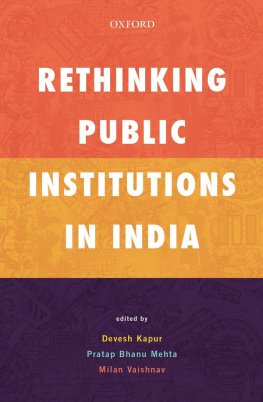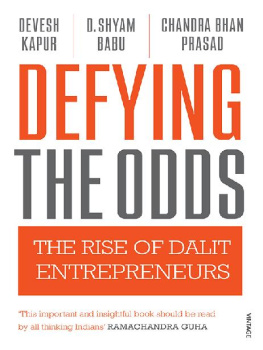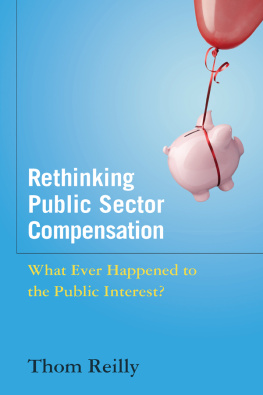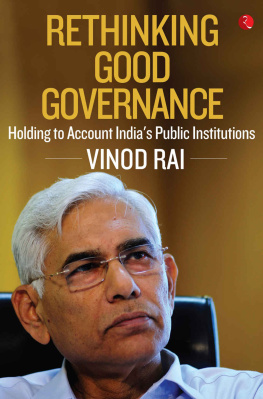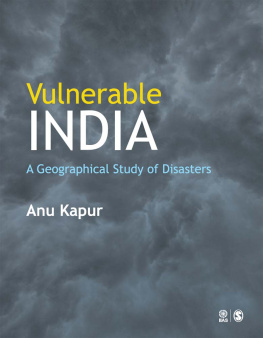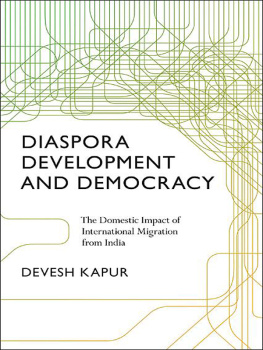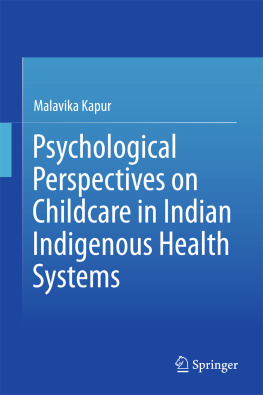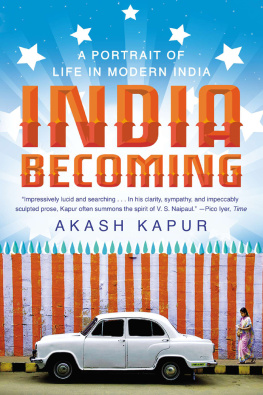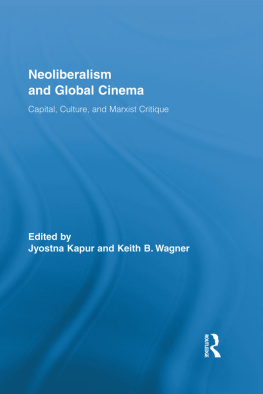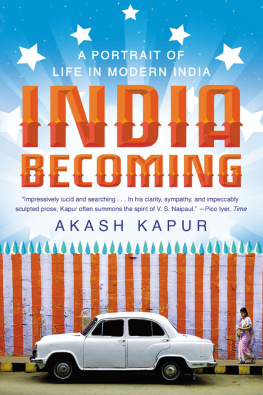Devesh Kapur - Rethinking Public Institutions in India
Here you can read online Devesh Kapur - Rethinking Public Institutions in India full text of the book (entire story) in english for free. Download pdf and epub, get meaning, cover and reviews about this ebook. year: 2018, publisher: Oxford University Press, genre: Politics. Description of the work, (preface) as well as reviews are available. Best literature library LitArk.com created for fans of good reading and offers a wide selection of genres:
Romance novel
Science fiction
Adventure
Detective
Science
History
Home and family
Prose
Art
Politics
Computer
Non-fiction
Religion
Business
Children
Humor
Choose a favorite category and find really read worthwhile books. Enjoy immersion in the world of imagination, feel the emotions of the characters or learn something new for yourself, make an fascinating discovery.
- Book:Rethinking Public Institutions in India
- Author:
- Publisher:Oxford University Press
- Genre:
- Year:2018
- Rating:4 / 5
- Favourites:Add to favourites
- Your mark:
- 80
- 1
- 2
- 3
- 4
- 5
Rethinking Public Institutions in India: summary, description and annotation
We offer to read an annotation, description, summary or preface (depends on what the author of the book "Rethinking Public Institutions in India" wrote himself). If you haven't found the necessary information about the book — write in the comments, we will try to find it.
Rethinking Public Institutions in India — read online for free the complete book (whole text) full work
Below is the text of the book, divided by pages. System saving the place of the last page read, allows you to conveniently read the book "Rethinking Public Institutions in India" online for free, without having to search again every time where you left off. Put a bookmark, and you can go to the page where you finished reading at any time.
Font size:
Interval:
Bookmark:
RETHINKING PUBLIC INSTITUTIONS IN INDIA
RETHINKING PUBLIC INSTITUTIONS IN INDIA
edited by
Devesh Kapur
Pratap Bhanu Mehta
and
Milan Vaishnav


Oxford University Press is a department of the University of Oxford.
It furthers the Universitys objective of excellence in research, scholarship,
and education by publishing worldwide. Oxford is a registered trademark of
Oxford University Press in the UK and in certain other countries
Published in India by
Oxford University Press
YMCA Library Building, 1 Jai Singh Road, New Delhi 110001, India
Oxford University Press 2017
The moral rights of the authors have been asserted
First Edition published in 2017
All rights reserved. No part of this publication may be reproduced, stored in
a retrieval system, or transmitted, in any form or by any means, without the
prior permission in writing of Oxford University Press, or as expressly permitted
by law, by licence, or under terms agreed with the appropriate reprographics
rights organization. Enquiries concerning reproduction outside the scope of the
above should be sent to the Rights Department, Oxford University Press, at the
address above
You must not circulate this work in any other form
and you must impose this same condition on any acquirer
ePub ISBN-13: 978-0-19-909128-7
ePub ISBN-10: 0-19-909128-5
Typeset in Berling LT Std 9.5/13
by The Graphics Solution, New Delhi 110092
Printed in India by Replika Press Pvt. Ltd
CONTENTS
Devesh Kapur, Pratap Bhanu Mehta, and Milan Vaishnav
James Manor
M.R. Madhavan
Madhav Khosla and Ananth Padmanabhan
Errol DSouza
Nirvikar Singh
Navroz K. Dubash
R. Sridharan
Amitabh Mukhopadhyay
K.P. Krishnan and T.V. Somanathan
E. Sridharan and Milan Vaishnav
T.R. Raghunandan
Tables
Figures
No edited volume is possible without the help of a large cast of characters. As the editors, we would like, first and foremost, to thank all of the contributors to the book. When we first set out to re-examine many of the issues first raised in the 2005 volume Public Institutions in India: Performance and Design, edited by two of us (Devesh Kapur and Pratap Bhanu Mehta), we reached out to the best scholars and practitioners we could think of who had a unique grasp of the workings of the Indian state. We were honoured and delighted thatto a personthey agreed to contribute their insights.
We are grateful to the Rockefeller Foundation for hosting a four-day book workshop at the Bellagio Center in July 2013, where we had a chance to discuss initial drafts of the chapters included here. We would like to thank Rob Garris and Joel Santana at Rockefeller for making the workshop possible and Laura Podio in Bellagio for her bountiful hospitality. We would also like to thank the Think Tank Initiative of Canadas International Development Research Centre (IDRC) for additional support. David Malone, IDRCs former president, was extremely supportive of the project. Milan Vaishnav is also grateful to the Carnegie Corporation of New York for its generous support of a research project on Indias state capacity.
The Bellagio conference was a joint effort of four institutions: the Center for the Advanced Study of India (CASI) at the University of Pennsylvania, Philadelphia, United States of America, the Centre for Policy Research, New Delhi, India, the Carnegie Endowment for International Peace, Washington, DC, United States of America, and the University of Pennsylvania Institute for the Advanced Study of India (UPIASI), New Delhi, India. We owe E. Sridharan, S.D. Gosain, and Ruchika Ahuja of UPIASI our gratitude for their tireless help in organizing and managing the conference logistics. Juliana Di Giustini of CASI deserves special thanks for making the conference such a success; her good cheer, attention to detail, and buon Italiano were indispensible. At Bellagio, we had the good fortune of learning from several experts who shared their insights and experience working in and studying India for many decades. Rajiv Lall, Pradnya Saravade, and Ronen Sen graciously lent their time, as did Marshall Bouton, who also serves on CASIs International Advisory Board.
When the time came to prepare the manuscript for publication, Saksham Khosla provided excellent editorial assistance. Aidan Milliff provided many useful inputs during the final stages of the editing process. The team at Oxford University Press in New Delhi was extremely enthusiastic about the project from the start. It has been a pleasure working with them on every aspect of the book. We also benefited enormously from the detailed comments of two anonymous reviewers, whose suggestions greatly improved the final manuscript. Ananth Padmanabhan was a great help in carrying out the initial formatting of the chapters. We would be remiss if we did not acknowledge the special contribution made by Madhav Khosla, who went out of his way to make sure that this project was a success. We are also grateful that Madhav and Ananth agreed, at a late date, to jointly author the chapter on the Supreme Court.
Last, but certainly not least, we would like to extend a special thanks to our colleagues, friends, and families for their unending support.
Devesh Kapur
Pratap Bhanu Mehta
Milan Vaishnav
February 2017
| AAP | Aam Aadmi Party |
| ACD | Anti-Corruption Division |
| ADR | Association for Democratic Reforms |
| AERO | Assistant Electoral Registration Officer |
| AG | Auditor General |
| AGMUT | Arunachal Pradesh, Goa, Mizoram, and Union Territories |
| AIS | All India Services |
| AMRUT | Atal Mission for Rejuvenation and Urban Transformation |
| AoR | Advocates-on-Record |
| APTEL | Appellate Tribunal for Electricity |
| AQMF | Annual Quality Management Framework |
| ARC | Administrative Reforms Commission |
| AS | Additional Secretary |
| ASEAN | Association of Southeast Asian Nations |
| ASOSAI | Asian Organization of Supreme Audit Institutions |
| ATR | Action Taken Report |
| BJP | Bharatiya Janata Party |
| BLO | Booth Level Officer |
| CAG | Comptroller and Auditor General |
| CBI | Central Bureau of Investigation |
| CBLO | Collateralized Borrowing and Lending Obligation |
| CCIL | Clearing Corporation of India Ltd. |
| CDR | Central Deputation Reserve |
| CEC | Chief Election Commissioner |
| CEO | Chief Electoral Officer |
| CGA | Controller General of Accounts |
| CIC | Central Information Commission |
| COPU | Committee on Public Undertakings |
| CPI | Consumer Price Inflation |
| CPSMS | Central Plan Scheme Monitoring System |
| CSO | Civil Society Organization |
| CSPMS | Central Sector Plan Monitoring System |
| CSS |
Font size:
Interval:
Bookmark:
Similar books «Rethinking Public Institutions in India»
Look at similar books to Rethinking Public Institutions in India. We have selected literature similar in name and meaning in the hope of providing readers with more options to find new, interesting, not yet read works.
Discussion, reviews of the book Rethinking Public Institutions in India and just readers' own opinions. Leave your comments, write what you think about the work, its meaning or the main characters. Specify what exactly you liked and what you didn't like, and why you think so.

